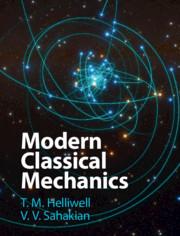In thermodynamics the enthalpy (H) (no relation to the Hamiltonian (H) ) is a function of the
Question:
In thermodynamics the enthalpy \(H\) (no relation to the Hamiltonian \(H\) ) is a function of the entropy \(S\) and pressure \(P\) such that \(\partial H / \partial S=T\) and \(\partial H / \partial P=V\), so that
\[d H=T d S+V d P\]
where \(T\) is the temperature and \(V\) the volume. The enthalpy is particularly useful in isentropic and isobaric processes, because if the process is isentropic or isobaric, one of the two terms on the right vanishes. But suppose we wanted to deal with isothermal and isobaric processes, by constructing a function of \(T\) and \(P\) alone. Define such a function, in terms of \(H, T\), and \(S\), using a Legendre transformation. (The defined function \(G\) is called the Gibbs free energy.)
Fantastic news! We've Found the answer you've been seeking!
Step by Step Answer:
Related Book For 

Question Posted:





